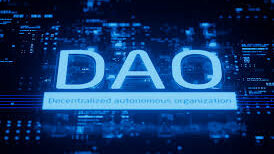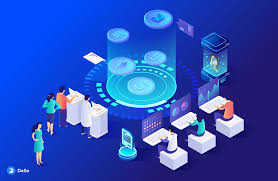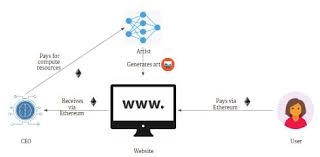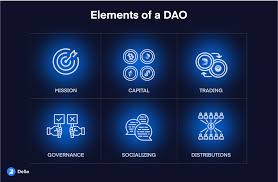
Introduction
Decentralized Autonomous Organizations (DAOs) represent a revolutionary shift in how organizations and businesses can be structured and governed. Unlike traditional organizations that rely on hierarchical management, DAOs are built on blockchain technology and are governed by smart contracts, allowing for decision-making processes to be decentralized, transparent, and automated. DAOs empower participants with voting rights and decision-making power, enabling them to collectively manage the organization’s rules, funds, and operations. With the potential to disrupt industries such as finance, governance, and even social enterprises, DAOs are paving the way for a more democratic and efficient model of organization.
How It Works
DAOs operate through a blockchain, typically using platforms such as Ethereum, where smart contracts are created to automate rules and processes. Here’s how they function:

- Blockchain and Smart Contracts:
The core technology of a DAO is blockchain, which ensures transparency, immutability, and security. Smart contracts are self-executing agreements coded into the blockchain that automate decision-making and enforcement without the need for intermediaries. - Governance and Voting:
In a DAO, decision-making power is distributed among participants who hold tokens that represent voting rights. Members can propose changes, allocate resources, and vote on key decisions, such as governance updates or financial investments. The voting system typically ensures that major decisions reflect the collective will of the community, rather than a central authority. - Tokenization:
Most DAOs use tokens (cryptocurrency) to facilitate participation and governance. These tokens can be earned, bought, or distributed, and they serve as the medium through which votes are cast. The more tokens a participant holds, the more influence they have on the outcome of votes. - Automation:
Once certain conditions are met or proposals pass a vote, the smart contracts automatically execute the desired actions. This removes the need for manual intervention and increases operational efficiency.
Potential Benefits

- Decentralization:
Unlike traditional organizations with centralized control, DAOs distribute power and authority among all participants. This ensures that decisions are made collectively, reducing the chances of corruption or mismanagement. - Transparency:
The blockchain infrastructure makes all activities and decisions within a DAO transparent and auditable. Every vote, transaction, and update is publicly recorded, providing a clear and immutable history of the organization’s actions. - Efficiency and Automation:
By using smart contracts, DAOs automate many of the processes involved in decision-making and fund management. This reduces bureaucracy and the need for intermediaries, leading to faster and more efficient operations. - Global Participation:
DAOs remove geographic barriers, allowing individuals from around the world to participate in governance. This opens up opportunities for people who may have been excluded from traditional decision-making processes. - Reduced Costs:
DAOs eliminate many administrative costs associated with traditional organizations, such as salaries for executives, legal fees, or middlemen. This is particularly advantageous for startups or organizations with limited resources.
Why It’s Underrated
Despite their innovative potential, DAOs remain underrated for several reasons:
- Legal and Regulatory Uncertainty:
DAOs operate in a legal gray area in many jurisdictions. The lack of clear regulations surrounding DAOs, especially when it comes to liability, taxation, and governance, creates uncertainty for potential participants and investors. - Scalability Challenges:
While DAOs can be highly efficient in smaller communities, scaling them to handle large numbers of participants or complex decision-making processes can be challenging. As the size of the DAO grows, the process of governance and decision-making may become cumbersome or inefficient. - Security Risks:
Smart contracts are only as secure as the code they are written in. Vulnerabilities or bugs in smart contracts can lead to exploitation, resulting in financial losses or compromised security. For example, in the past, high-profile hacks like the DAO hack in 2016 led to millions of dollars in losses, highlighting the risks of inadequate security measures. - User Adoption:
DAOs are still relatively new concepts, and the technological and participatory barriers can deter widespread adoption. Many users still lack an understanding of blockchain technology, tokens, and governance systems, which limits the potential growth of DAOs.
Challenges Ahead
- Governance Issues:
One of the major challenges facing DAOs is ensuring effective governance. With decentralized decision-making, there’s a risk of decision paralysis or conflict between community members with competing interests. Furthermore, ensuring that voting is not dominated by a few large token holders is a key challenge. - Legal Frameworks and Liability:
The legal status of DAOs is still evolving, and they face challenges regarding how to be treated by tax authorities, regulators, and courts. The lack of clarity regarding ownership, responsibility, and legal enforcement is a significant hurdle to widespread adoption. - Security and Bugs in Smart Contracts:
Smart contracts are susceptible to coding errors and vulnerabilities that can lead to hacking and financial losses. Ensuring that code is thoroughly audited and verified is essential to prevent malicious exploits. - User Accessibility:
DAOs rely on participants having a certain level of technical knowledge, including familiarity with blockchain and cryptocurrencies. Making DAOs accessible to a broader audience requires simplifying user interfaces, improving education, and lowering entry barriers.
Conclusion

Decentralized Autonomous Organizations (DAOs) offer an innovative and transparent way to manage and govern organizations without the need for centralized authority. By using blockchain technology and smart contracts, DAOs enable more efficient decision-making, greater participation, and enhanced security. While DAOs hold immense potential to transform industries ranging from finance to governance, challenges such as legal uncertainty, scalability, and security risks still need to be addressed. With continued advancements in blockchain technology, as well as evolving regulatory frameworks, DAOs could become a key feature of the future, offering a more democratic and efficient way of organizing collective efforts across the globe.
